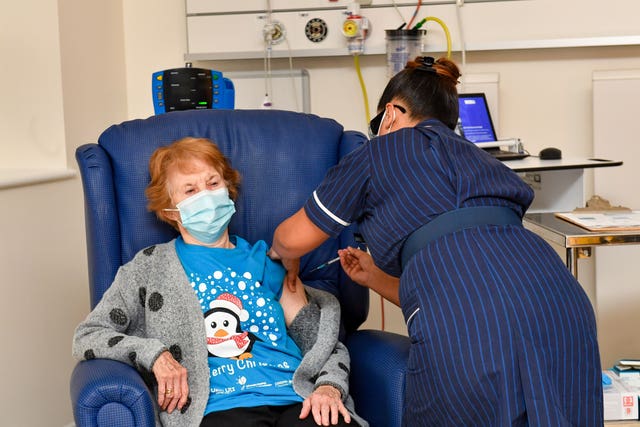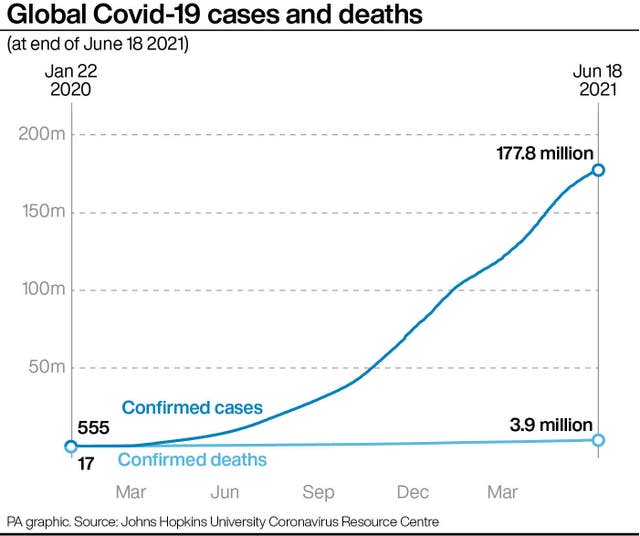Cautious optimism as ‘race is on’ between Covid-19 vaccine and third wave
There has been a 79% rise in one week in cases of the Delta variant first identified in India.

The race is on between the Covid-19 vaccine and a third wave of the virus but there are grounds for cautious optimism, advisers to the Government have said.
The experts’ comments come after Public health England said there has been a 79% rise in one week in cases of the Delta variant first identified in India.
The increase across the UK is being driven by younger age groups, many of whom have now been invited for a vaccination as the jab rollout extends to anyone aged 18 and over.
Hospital cases have almost doubled although most of those needing treatment have not had a vaccine.
Professor Adam Finn, who advises the Government on the Joint Committee on Vaccination and Immunisation (JCVI), said a “third wave” of coronavirus infections “is definitely under way”.
The University of Bristol academic told BBC Radio 4’s Today programme: “It’s going up, perhaps we can be a little bit optimistic it’s not going up any faster, but nevertheless it’s going up, so this third wave is definitely under way.
“We can conclude that the race is firmly on between the vaccine programme, particularly getting older people’s second doses done, and the Delta variant third wave.”
Prof Finn said the JCVI is still working to decide whether children should be vaccinated but said that effort would not be the immediate priority if it was approved.
“Even if some decision were made to immunise children it wouldn’t be appropriate right now, either here or anywhere else in Europe, to give our doses predominantly to children because it’s adults that get sick, so vaccinating adults is clearly the priority right now,” he said.
Prof Finn was asked if he feels confident that we are going to outpace the Delta variant with the current rate of vaccination, and he told Times Radio: “No, I don’t feel confident, but I think there’s some grounds for optimism.
“The latest ONS figures continue to show a rise, but that rise has not accelerated quite as much as I’d feared over the last week.
“So, the race is on. The sooner we can get, particularly second doses, into older people, the less of a hospitalisation wave we’ll see this time around.

“That’s the critical thing, that’s what’s grounded us all in the past, and if we’ve managed to protect enough older people that we can avoid a great big surge of hospitalisations and deaths, then things will be able to move back towards normal.”
Dr Mike Tildesley, epidemiologist and a member of the SPI-M modelling group, said he is “cautiously hopeful” that the number of Covid-19 hospital admissions over the next few weeks will not be on the same scale as happened in January.
He said those going to hospital at the moment tend to be slightly younger and “slightly less sick”.
He told BBC Breakfast: “Currently we’re seeing slightly younger people are becoming infected, and actually the people going to hospital tend to be slightly younger, and therefore also slightly less sick, which is again quite a good sign that even if we’re starting to see more people going into hospital they tend to be younger people who have higher likelihood of recovering successfully.
“I realise I’m being slightly cautious here. All of these are cautiously good signs but, of course, we do need to keep an eye on this over the next couple of weeks so that we can give as much information as we can to the Government prior to the 19th of July reopening.”

Meanwhile, giant jab clinics are open in London this weekend, with the Olympic Stadium, Tottenham Hotspur FC, Chelsea FC and Charlton Athletic FC among those that will host large scale pop-up clinics for residents, with smaller events taking place in local community venues.
It comes as officials are reportedly considering scrapping the 10 days of self-isolation for people who have been double vaccinated and come into contact with someone infected with Covid-19.
The Times reported that Health Secretary Matt Hancock is said to be keen to replace quarantine with daily testing, but that the policy will be approved only after Professor Chris Whitty, the chief medical officer for England, is satisfied with the results of a study of 40,000 people.





